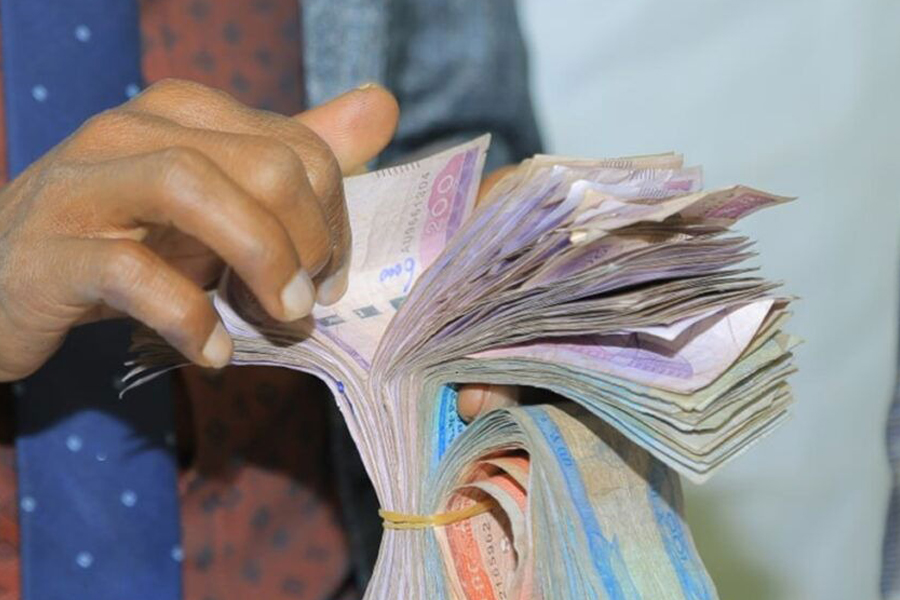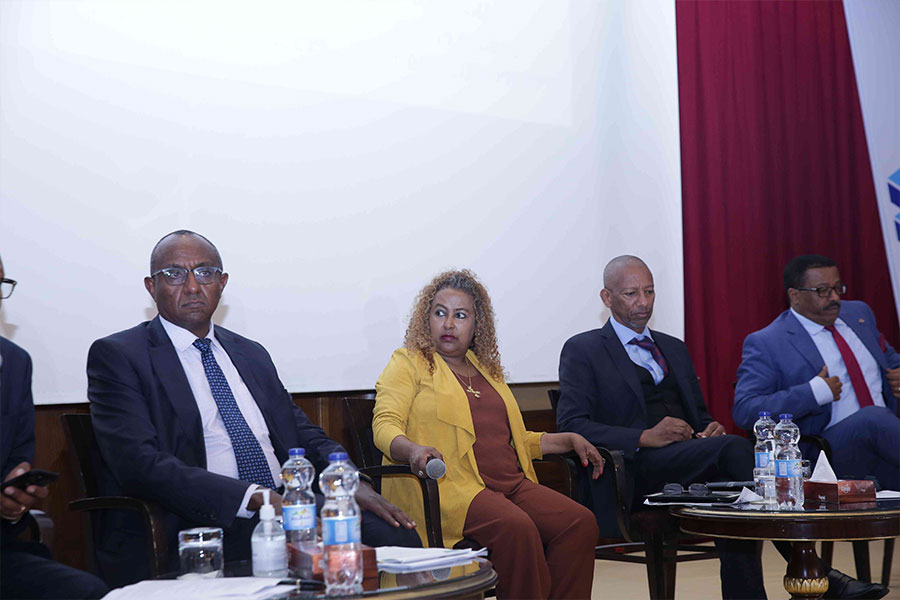
Radar | Jun 17,2023
Yitbarek Nigussie, 24, was making a deposit for his bets for eight Champions League games that were going to take place on Wednesday night, November 6, 2019, at Vamos Betting house at Gotera Condominium when Fortune approached him for an interview. He runs a delivery business on a motorbike. Before the motorbike ban in the city slowed his business down for the past five months, he used to earn about 1,000 Br a day.
He started betting three years ago, and he once won 12,000 Br. He spends about 60 Br every week, and he claims that he usually wins between 2,000 and 3,000 Br every month.
The sport betting games have a variety of options and a complex mix of combinations of the various sporting events. One chooses to bet depending on the number of matches, which side would win, or whether both sides draw. There is also a possible option for betting on the number of goals to be scored in a given match, or which player would score and how many goals, and whether the goals would be scored before or during the second half of a given match. Depending on the matrix, the amount of prize money may be higher or lower even for the same amount of money one places on the chosen bets.
The betting games include largely the soccer matches in Europe such as Champions League, English Premier League, and other renowned national leagues in Italy, Spain and Germany. Apart from these, other types of sports activities such as tennis, basketball, and even ice hockey are also on the menu and are gradually attracting an increasing number of participants toward betting.
There has been an increase in the number of betting companies in Ethiopia with 32 businesses registered with the National Lottery Administration. 17 of them have already become operational.
Gezahegn Yilma, licensing and control team leader at the National Lottery Administration, told Fortune that the businesses are first required to submit their proposal along with a bank statement for their initial capital investment and a lease agreement for their shops. The companies are also expected to enter into a contractual agreement with social development projects to donate 20pc of their profits to the social causes they have chosen to support.
Habesha Betting started operations three years ago with a registered initial investment of 50,000 Br, said Mersha Bizualem, project manager at the company. It runs more than 40 branch shops in Addis Abeba, and they plan to expand their operations to the major cities and towns across the nation.
Yenebilh Bantayehu is the general manager at Vamos Betting, another company that started operating about 10 months back. With an initial capital investment of 50,000 Br, it has now opened 35 shops across the city with an additional eight more shops that are going to be opened soon, Yenebilh told Fortune.
Adding an explicit statement to their betting website, “Betting is addictive and can be psychologically harmful,” Yenebilh says he encourages responsible participation in the betting games.
Customers have to choose the most suitable combinations of different games to maximize their chances of winning bigger prizes.
Abreham Melaku, 24, graduated in chemical engineering from Addis Abeba University last year and spends about 50 Br a month on betting. He says he plays the betting game just for fun, and he claims to have no addiction to betting games. However, his friend who once won nearly 200,000 Br has become so addicted to betting and is completely immersed in the betting craze, Aberham said.
The game particularly affects those under the age of 18 who may not have their own income but have to rely on their parents to get the money they spend on betting. It may probably encourage some to steal when they cannot get the money they need to spend on gambling, some argue.
“We do not accept students in school uniforms coming to our shops, and we don’t open shops within a 100m radius of schools,” Yenebilh of Vamos noted, also referring to the bold announcement placed visibly on all the shops regarding the minimum age limit of 18 years old.
“There are a lot of misunderstandings among the public toward this business, but I hope it will be clarified more gradually,” Mersha from Habesha Betting said.
His company puts a visible notice to forbid underage children from participating in the betting games. Mersha claims they have assigned security personnel to check and prohibit underage users from coming into the shops for betting.
He insisted that his company promotes responsible participation in the betting games among their customers, though he admitted noticing that some may have spent too much of their time on betting.
“Betting is much different from other forms of addictions, since it has more entertainment value than the negative side effects,” he remarked.
Seble Hailu, a counselor and general manager of Ende Communication Consultancy & Trading Plc, recognises the potentially addictive nature of continued involvement in the betting games. The hormones produced in the brains, which are associated with the level of involvement in those activities, could reinforce the behaviour to the point where people could hardly think or do anything different for a long time.
Seble pointed out that the monetary prizes involved in the betting game may further enhance the addictive process in addition to the mere psychological satisfaction of winning the bets. The possible impact differs from individual to individual, and it should, therefore, be approached individually, not necessarily through a blanket approach of banning the entire activity at a societal level, according to her.
The European soccer matches are the most favorite games in the local betting businesses with the English Premier League and the Champions League matches dominating the craze in betting.
“In a way, betting should not be viewed as something very different from such activities as drinking alcohol or watching movies,” Seble said.
Unless betting is widely used for destructive ends, it may enhance socialisation and create personal satisfaction if people do it with appropriate measure and balance, she advised.
Seble agreed that the impact may be much more prominent on young people below 18, and the regulatory measures should be well enforced to protect the wellbeing of this segment of the population in particular.
The National Lottery Administration is the government authority responsible for regulating these businesses to ensure their compliance with the regulatory framework in place. For instance, the businesses are expected to post an announcement on a visible place in every shop they run to notify customers of the age restriction.
In addition to the regulation by the Authority, the businesses themselves should also take a more proactive approach to regulate their own business operations, Vamos's general manager reflected.
“Proper enforcement of the existing regulation may address much of the concerns raised about the conduct of this business,” Yenebilh said.
He has the intention to initiate the establishment of a sport betting companies association which can bring them all together under the leadership of the National Lottery Administration to collectively tackle the challenges in the conduct of their business.
Gezahegn of National Lottery believes the legal betting businesses are helping to counteract similar illegal activities. They also help generate revenue to the government and create job opportunities for over 1,000 people, he reasoned. He also added the regulatory framework may be revised in the future after it has been assessed for a while to identify the existing gaps. Gezahegn said that the businesses generated 17 million Br in the last fiscal year as commission in addition to the income tax revenue they generated. He highlighted the top betting companies at present based on the amount of revenue they generated last year as Habesha, Axum, Vamos, Hulegeb and Galaxy betting companies.
As of October 2019, there were 125 people directly employed by Vamos in addition to the indirect employment opportunities created for about 60 securities guards employed through other agencies, Yenebilh noted.
Habesha Betting employs 120 people, mostly young women, and it also generates additional income to the government in the form of commission, VAT and 15pc income tax collected from the winners.
Yenebilh also declared that last September, his company paid more than one million Br in turnover taxes, in addition to 1.7 million Br in commission paid to the National Lottery Administration. For prizes more than 1,000 Br, it is mandatory to collect 15pc income tax from the payout to individual winners.
The maximum prize they set for the biggest win is 350,000 Br.
Still, Mersha said Habesha once paid more than 760,000 Br to one customer for three bets the winner accidentally had placed on the same betting games with just a 40 Br initial deposit.
Both Habesha and Vamos focus only on the international sporting events as they do not find the local sports activities suitable to the betting business since they lack a strict and predetermined time table for the games.
Abreham is still looking for an employment opportunity in his field of study, even though he had a business idea to start the production of scented candles, which he said are not so common in the local market. But to realize his idea, he needs access to finance or someone who is willing to invest in his project idea.
Yitbarek said he heard about someone winning 767,000 Br from Habesha Betting, and if he could ever win such a big amount, he would buy a taxi and open a shop for his family.
PUBLISHED ON
Nov 09,2019 [ VOL
20 , NO
1019]

Radar | Jun 17,2023

Commentaries | Oct 26,2024

Agenda | Apr 06,2019

View From Arada | Jan 21,2023

Fortune News | Jan 01,2023

Radar | Nov 21,2020

Agenda | Aug 04,2024

Fortune News | Jan 29,2022

Agenda | Jun 29,2024

Fortune News | Mar 11,2023

Dec 22 , 2024 . By TIZITA SHEWAFERAW
Charged with transforming colossal state-owned enterprises into modern and competitiv...

Aug 18 , 2024 . By AKSAH ITALO
Although predictable Yonas Zerihun's job in the ride-hailing service is not immune to...

Jul 28 , 2024 . By TIZITA SHEWAFERAW
Unhabitual, perhaps too many, Samuel Gebreyohannes, 38, used to occasionally enjoy a couple of beers at breakfast. However, he recently swit...

Jul 13 , 2024 . By AKSAH ITALO
Investors who rely on tractors, trucks, and field vehicles for commuting, transporting commodities, and f...

Sep 13 , 2025
At its launch in Nairobi two years ago, the Africa Climate Summit was billed as the f...

Sep 6 , 2025
The dawn of a new year is more than a simple turning of the calendar. It is a moment...

Aug 30 , 2025
For Germans, Otto von Bismarck is first remembered as the architect of a unified nati...

Aug 23 , 2025
Banks have a new obsession. After decades chasing deposits and, more recently, digita...